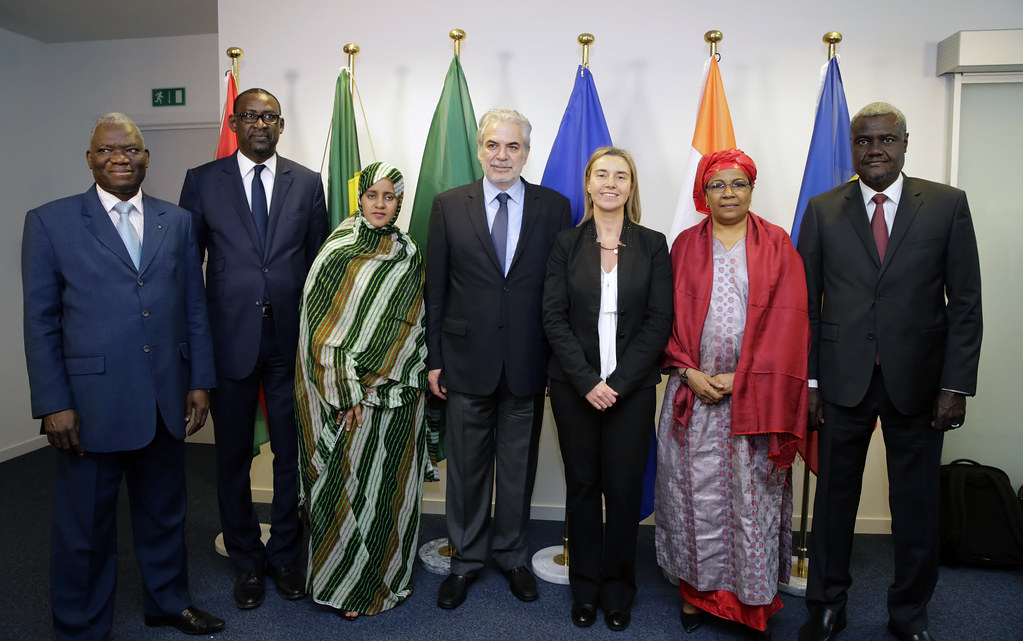Photo: “High Representative Mogherini meets Foreign Affairs Ministers from the Sahel region”/European External Action Service/CC BY-NC 2.0
What is the role of the EU in the fields of preventing and countering violent extremism (P/CVE) in the Sahel?
Following the adoption of the EU Sahel Strategy in 2011 and in anticipation of the upcoming release of its renewed strategy, on 14 January 2021 the Sant’Anna School of Advanced Studies (SSSA) in Pisa and the Alliance for Rebuilding Governance in Africa (ARGA) based in Senegal, organized an online discussion to take stock of the EU engagement in the region. In the framework of PREVEX, several regional experts, researchers, institutional officials and civil society actors held a debate on the policies, actions and projects, as well as the underlying concepts and narratives, through which the EU substantiates its P/CVE practices.
Abdoul Wahab Cissé (ARGA) presented the latest PREVEX ‘Policy Brief summarizing the EU and other stakeholders’ prevention strategy towards violent extremism in the Maghreb and the Sahel’, suggesting that the securitization narrative, with its emphasis on assistance that builds local capacities to repress violent extremism, disrupt its networks, and neutralize militants, is by far the predominant frame through which P/CVE initiatives are conceived in the Sahel.
The European Union in the Sahel
In fact, the EU has also been involved in the adoption of a number of strategies in the domains of security and development, for example in Niger. Moulaye Hassane, Head of the Fight against Radicalization and Violent Extremism Program from the Center for Strategic and Security Studies of Niger, argued that developing effective communication strategies from local communities towards the different policy-making spheres is one of the main challenges that still need to be addressed.
Furthermore, Ornella Moderan, Head of the Sahel Program at the Institute for Security Studies based in Bamako, pointed out that while it is important to account for EU P/CVE efforts in the fields of hard security, social cohesion and economic recovery, it is essential to look at the broader EU approach in the region, including the humanitarian field, health- and education-related projects.
Given all the initiatives, the main challenge rests on coordinating these efforts, not only within the EU structures and bodies involved, but also among the different EU Member States and all the other intervening actors in the Sahel.
Most of P/CVE projects tend to assume that radicalization and violent extremism are mostly driven by radical religious ideology, Ornella Moderan explained that radicalization is a very complex phenomenon where religious motivations play a marginal role. The reasons to join jihadist groups are manifold and the factors are not mutually exclusive. Thus P/CVE efforts need to have a multisectoral approach accounting for the complexity of the reality on the ground and they need to have more programmatic flexibility allowing for rapid adjustments as the situation changes.
Promoting dialogue with local communities
Another key point in the discussion with local experts was the need to promote dialogue with local communities transforming them from participants to actors. This means having a more localized approach, supporting local ownership of civil society organisations (CSOs) by encouraging more small-scale projects rather than overly ambitious projects and by simplifying heavy bureaucratic procedures that require big administrative apparatuses and proficiency in a specific formal jargon. Considering that the Malian and Nigerian CSO universe is mostly populated by small organizations, these obstacles tend to hinder participation for most of them.
It is also striking that while insurgents groups have adopted localized strategies and are extremely reactive, according to Ornella Moderan, the actors’ heavy institutional machines that wish to counter them become a burden as they need to follow institutionalized procedures which inevitably slow down the process.
It has also been argued that if, on the one hand, violent entrepreneurs have proven to be skillful in exploiting frustration for the lack of governance and services, on the other hand, the envisaged solution of the reestablishment of the rule of law depends on what kind of state should be restored. Abdoul Wahab Cissé called argued that stabilization should also entail the transformation of a predatory state into a nurturing one serving the people.
A remarkable example of building resilience and local ownership was given by a participant from Taoudenni in the north of Mali who explained how his association Paix et Progrès set up a project to create an economic pole revolving around a salt mine. Two years on, it represents not only a source of income for the local communities, but it is also a gathering center which is protected and cherished by the community.
A real theory of change is still lacking
Finally, Luca Raineri (SSSA), pointed out that although the EU in its P/CVE approach is claiming to attach great importance to development in the Sahel as it considers that the main drivers towards violent extremism are poverty and the lack of perspectives, a real theory of change is still lacking.
So, it would be necessary for the EU to develop a more coherent and theoretically founded theory of change of violent extremism by investing in large-scale research programmes on the drivers of violent extremism and fine-grained conflict analyses of the contexts of P/CVE interventions. He also stressed that while the EU is claiming to do gender mainstreaming in P/CVE, the analysis showed that the gender dimension is the least developed in EU practices.
Overall, the situation is extremely complex and there is no one-size-fits-all approach. At this point, there are more questions than answers, and while more research is needed, all the actors involved, the international community and researchers included, should listen more to the realities on the ground.




